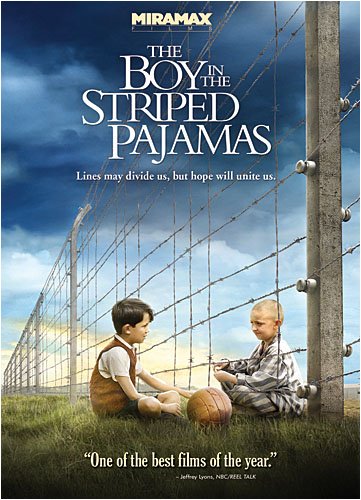All Nonfiction
- Bullying
- Books
- Academic
- Author Interviews
- Celebrity interviews
- College Articles
- College Essays
- Educator of the Year
- Heroes
- Interviews
- Memoir
- Personal Experience
- Sports
- Travel & Culture
All Opinions
- Bullying
- Current Events / Politics
- Discrimination
- Drugs / Alcohol / Smoking
- Entertainment / Celebrities
- Environment
- Love / Relationships
- Movies / Music / TV
- Pop Culture / Trends
- School / College
- Social Issues / Civics
- Spirituality / Religion
- Sports / Hobbies
All Hot Topics
- Bullying
- Community Service
- Environment
- Health
- Letters to the Editor
- Pride & Prejudice
- What Matters
- Back
Summer Guide
- Program Links
- Program Reviews
- Back
College Guide
- College Links
- College Reviews
- College Essays
- College Articles
- Back
The Boy In The Striped Pajamas
Director: Mark Herman
Cast: Asa Buttefield. Jack Scanlon. David Thewlis, Vera Farmiga, Amber Beattie, Rupert Friend
One of the many Nazi-Germany oriented films this year (including the long awaited Valkyrie), The Boy In The Striped Pyjamas proves to be superior among its competitors. The story revolves around a young boy named Bruno (Asa Butterfield), who's family moved to Poland to become closer to the man of the house, Ralf (David Thewlis, renowned for his recent ‘Harry Potter' fame). Bruno (who strangely has a prominent British accent although playing a German-born citizen, like many others in the film), completely naïve to all around him, meets a Jewish boy named Shmuel ( Jack Scanlon) , who like many other lads in the ‘40s, likes chess and sugary treats, instantly befriends him in a heart warming, yet tragic friendship. Mother, Elsa, (Vera Farmiga, The Departed) also co-stars in this low-budget, yet magical Independent film, which justifies John Boyne's poignant novel to an extent, while no film comes close to capturing the original novel, The Boy In The Striped Pyjamas comes pretty close, though the ending to the novel and the ending to the film contrast many different ways. The ending to the novel is more subtle, more delicate and not so harsh as the film. The director of the films seems to be forcing the emotion out of the audience, instead of letting it come natural, though as sad as it may seem, it loses its intrigue and mystery surrounding it. The end of the book seems to concentrate on the fragile downfall of Father, rather than Mother. A once high and powerful Nazi figure reduced to a child sitting by the fence, a mess, staring into the abyss, dreaming of a child he'll never hug, a body he'll never burry. Though many could claim that the ending of the book is not clear, I do believe the ‘he wasn't there of course' is clear enough. He was never going to return. Though the ‘in your face' tactic is more prone to evoke tears, but if the director went with the original idea, we might not have cried, but we would have been void of emotion, the ambiguity would have left us struck, a state of mind that a director would rather induce in his audience. A more surreal and even delicate version of the tragedy of the Holocaust, one character that stood out to me was Elsa. Her naivety on the Anti-Semitism surrounding her, oddly, but completely oblivious to the teachings of her children and the job in the army of her husband, her feelings for the Nazi part dispersed once she found out what the volatile smoke slithering out of the chimney actually was. Her child like demeanour becomes apparent as she melts from a strong woman to a small child. Her reluctance to betray her family and her uncertainty of how to treat non-Gentiles leaves her confused. Her dedication to Bruno and her witnessing of the downfall of her little girl slowly breaks her heart and as the film goes by, it's apparent in her face. This role will not get Farmiga recognized, but Film Critics can appreciate her carefully executed role as one of the best of the year. A wonderful film and deeply depressing ending that shows not complete realism (Were the camps that easy to escape into? Surely they would be that easy to escape out of?), but a portrayal of the saddening death of many Jews crammed into the eyes and ears of one little boy. Wonderful.
Rating: ****
Similar Articles
JOIN THE DISCUSSION
This article has 0 comments.

